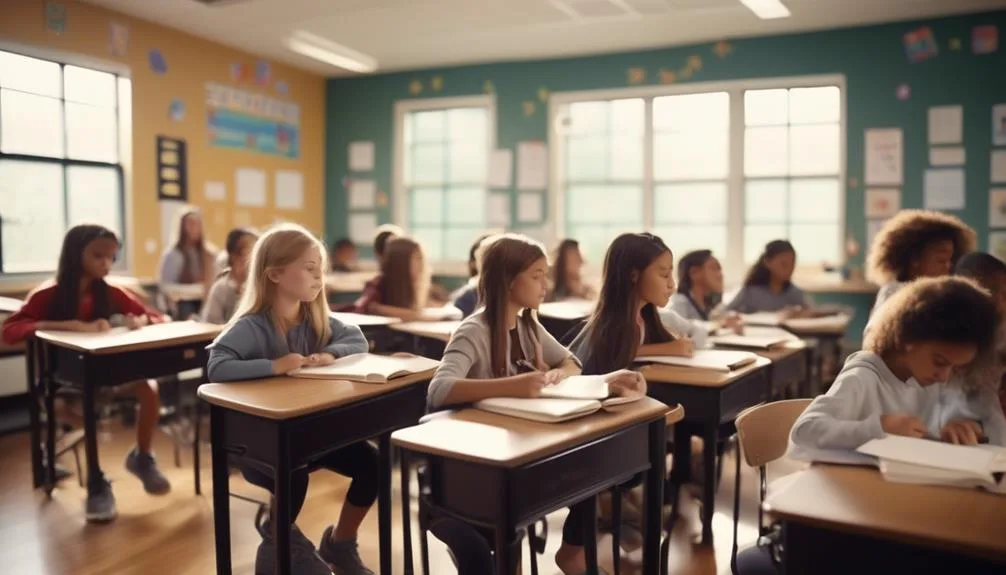Feeling a bit overwhelmed by life's ups and downs? It's time to tap into a powerful tool that can help you navigate through challenges with ease.
Unlocking the power of self-regulation allows you to take charge of your emotions and behaviors, giving you the control you've been longing for.
But how exactly does self-regulation work? And how can you master this skill?
In this discussion, we'll explore the ins and outs of self-regulation, uncovering its secrets and providing you with practical strategies to help you unlock your full potential.
So, get ready to discover the key to mastering control and transforming your life.
Key Takeaways
- Self-regulation involves controlling oneself by oneself, including managing emotions and resisting impulsive behaviors.
- Self-regulation is important for gaining control over one's behavior and life and can be categorized as behavioral or emotional self-regulation.
- Self-regulation theory outlines the process of decision-making, including setting standards of desirable behavior, motivation, monitoring situations and thoughts, and using willpower to resist temptations.
- Self-regulation skills develop during early childhood and are important for academic success, social interactions, and emotional well-being. Parental support and modeling play a crucial role in developing self-regulation.
Understanding Self-Regulation
Understanding self-regulation is key to gaining control over your behavior and emotions. Self-regulation techniques are tools that can help you manage your thoughts, emotions, and actions in a more intentional and effective way.
By practicing self-regulation, you can experience a range of benefits. Firstly, self-regulation allows you to make better decisions, as it helps you think more clearly and consider the consequences of your actions. It also enables you to handle stress and difficult situations more effectively, reducing the likelihood of impulsive or harmful behaviors.
Additionally, self-regulation promotes emotional well-being, as it helps you regulate your emotional responses and maintain a sense of balance. By practicing self-regulation techniques, you can improve your overall self-control and lead a more fulfilling and purposeful life.
The Importance of Self-Regulation Theory

Self-Regulation Theory plays a vital role in understanding and mastering control over your behavior and emotions. It provides a framework for decision-making and setting standards of desirable behavior. Motivation is a key factor in self-regulation theory, as it drives individuals to meet those standards and maintain them.
By monitoring situations and thoughts, you can ensure that your behavior aligns with your desired outcomes. Self-regulation also has a significant impact on academic success. Developing self-regulation skills allows you to focus on tasks, resist distractions, and manage time effectively. It helps you stay motivated, set goals, and persevere through challenges.
Exploring the Psychology of Self-Regulation

The ability to control your behavior and emotions is a fundamental aspect of human psychology, shaping how you navigate through life and interact with others. Self-regulation, the process of consciously directing your thoughts, emotions, and actions, plays a significant role in this ability.
Motivation is a key factor in self-regulation, as it provides the drive and energy necessary for maintaining control. When you're motivated to achieve a goal or adhere to certain standards, you're more likely to regulate your behavior and make choices that align with those goals.
Additionally, self-efficacy, which refers to your belief in your own abilities, influences your thoughts, feelings, motivations, and actions. When you have high self-efficacy, you're more likely to engage in effective self-regulation, leading to better outcomes.
Understanding the psychology behind self-regulation can help you develop strategies to improve your control over your behavior and emotions, ultimately enhancing your well-being and success in life.
Nurturing Self-Regulation in Early Childhood

Developing self-regulation skills in early childhood is crucial for fostering emotional well-being, academic success, and positive social interactions. During this critical period of development, children are learning to navigate their emotions, control their impulses, and regulate their behavior. As a parent or caregiver, you play a vital role in nurturing these skills.
Here are three teaching strategies to help foster self-regulation in early childhood:
- Model self-regulation: Children learn best by observing and imitating. By demonstrating self-regulation in your own behavior and emotions, you provide a powerful example for them to follow.
- Provide structure and routine: Establishing consistent routines and clear expectations helps children develop self-control and self-discipline. Predictable environments provide a sense of security and help children regulate their emotions more effectively.
- Offer guidance and support: Be patient and understanding when your child is struggling to regulate their emotions or behavior. Offer guidance, teach them coping strategies, and provide support as they navigate their feelings and reactions.
Effective Activities for Training Self-Regulation Skills

To effectively train self-regulation skills, engaging in purposeful activities that promote self-awareness and emotional control is key. Mindfulness exercises are an effective way to cultivate self-regulation skills. These exercises involve focusing on the present moment, observing thoughts and emotions without judgment, and practicing deep breathing and relaxation techniques.
By bringing attention to the present moment, individuals can better regulate their emotions and responses to external stimuli. Journaling activities are another valuable tool for training self-regulation skills. By expressing thoughts and emotions in a structured and reflective manner, individuals can gain insight into their own patterns of behavior and emotional triggers.
Journaling also provides an opportunity for self-reflection and self-discovery, allowing individuals to identify areas for growth and develop strategies for managing emotions and behaviors more effectively. Incorporating mindfulness exercises and journaling activities into your routine can support your journey towards mastering self-regulation.
Frequently Asked Questions
What Are Some Common Challenges That People Face When Trying to Develop Self-Regulation Skills?
When developing self-regulation skills, you may face challenges like overcoming distractions and impulse control. It's important to manage stress and emotions effectively. Remember, it takes practice and self-awareness to master control.
Can Self-Regulation Skills Be Learned and Improved Upon, or Are They Innate Traits That Some People Naturally Possess?
Self-regulation skills can be learned and improved upon, regardless of innate traits. According to research, individuals who actively practice self-regulation strategies experience better emotional well-being and achieve greater success in various areas of life.
How Does Self-Regulation Impact Academic Performance and Success in School?
Self-regulation plays a crucial role in academic success and career achievement. By managing emotions and impulses, you can focus on tasks, set goals, and make better decisions. It positively impacts psychological well-being and helps you thrive in school and beyond.
What Are Some Strategies That Parents Can Use to Support and Encourage the Development of Self-Regulation Skills in Their Children?
To support and encourage your child's self-regulation skills, try modeling the behavior you want to see and setting clear expectations. These strategies can help them develop control and make better choices in life.
Are There Any Specific Age Groups or Developmental Stages Where Self-Regulation Skills Are Particularly Important or Critical to Development?
During specific age groups and critical developmental stages, self-regulation skills are particularly important. They lay the foundation for academic success, social interactions, and emotional well-being. Supporting and nurturing these skills can have long-term benefits for children's development.
Conclusion
Congratulations! You have now unlocked the power of self-regulation and mastered control over your emotions and behaviors. By understanding the psychology behind self-regulation and implementing effective strategies, you have gained a greater sense of control and well-being.
Your journey towards self-regulation has been transformative, allowing you to confidently navigate through life's challenges with ease. Embrace this newfound power and continue to nurture your self-regulation skills, for the possibilities are limitless when you're in control.
Remember, you hold the key to your own success!

